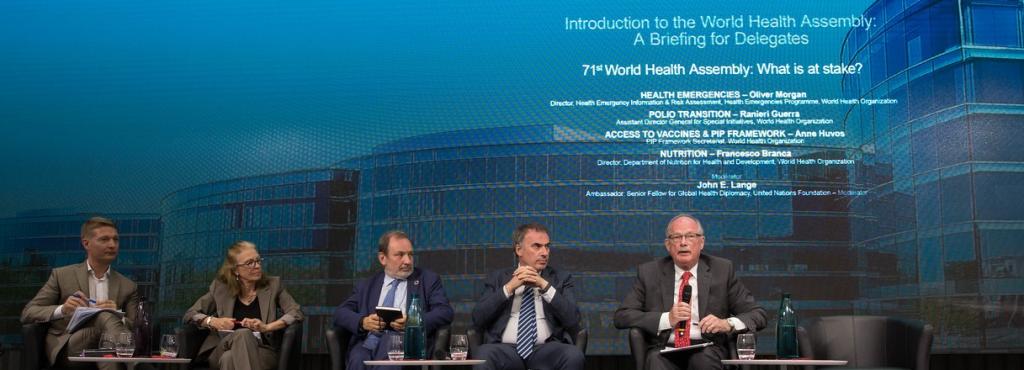“What cannot be measured, cannot be accomplished”, these are the words of Samira Asma from the World Health Organization (WHO)’s Health Metrics and Measurement Cluster to describe one of the major shifts of WHO’s 13th General Programme of Work (GPW).
The draft 13th GPW, embedding the Organization’s vision and strategic plan for the next five years, took centre stage at the annual Introduction to the World Health Assembly (WHA) organised by the Global Health Centre and the United Foundation on 20 May 2018. As highlighted by Peter Singer, Senior Advisor to the WHO Director General, the aim is to achieve impact for people at the country level. The focus on implementation is supplemented by the development of the first ever investment case and the establishment of an impact framework as a way to track progress on the GPW and the Sustainable Development Goals (SDGs). However, monitoring and reporting will depend on the measurement and the availability of data in countries requiring a strong WHO at the country level and a greater support to national data systems.
With the SDGs setting the direction, the next GPW relies on a broader vision of health and well-being, positioning WHO as a health organisation beyond the medical dimension. However, Ambassador Anders Nordström from the Swedish Foreign Ministry considered that the target of ‘1 billion more people enjoying better health and well-being’ should have included a greater emphasis on multisectorality and the establishment of an enabling environment for people to make healthy choices and live a healthy life. In line with the SDGs, reaching this target will require a greater engagement of health ministries with other sectors and actors to “think health instead of healthcare”.
As pointed out by Loyce Pace of the Global Health Council, a broader understanding of health also opens the door for greater civil society engagement with the WHO. The 13th GPW as one of WHO’s most consulted strategic plans did not only include language on partnership, even though WHO’s leadership made an effort to reach out to non-state actors, including the private sector, with a willingness to promote dialogue and a mindful management of conflicts of interest. “We have more in common than not” agreed Fumie Griego from the International Federation of Pharmaceutical Manufacturers and Associations (IFPMA), highlighting the need for leveraging all available resources in the pursuit of the shared goal of better health for all.
Thematic presentations at the event provided some practical examples of multistakeholder collaborations. The Pandemic Influenza Preparedness (PIP) Framework is a partnership between Member States, national laboratories, vaccine manufacturers and the WHO, with established responsibilities for sharing viruses and contributing to a global benefit sharing system. Ann Huvos of the PIP Framework Secretariat also emphasised the importance of greater dialogue and collaboration beyond the health sector, including in upcoming discussions on biological diversity and access to genetic resources.
A draft approach for the prevention and management of conflicts of interest in the policy development and implementation of nutrition programmes at the country level was also on the WHA agenda. Francesco Branca of the WHO Department of Nutrition for Health and Development clarified that this process will require further consultations, but it provides an opportunity to reflect upon how to put in place constructive collaborations for public health.
Despite the substantive and organisational shifts included in the new GPW, many challenges remain. As shown by Ranieri Guerra, WHO Assistant Director General for Special Initiatives, health gains in countries and sustainable financing of the WHO are at risk in the polio transition process. In fact, the polio eradication budget amounts for about a fourth of WHO expenditures, while polio eradication activities are linked to specialised human resources, routine immunisation, surveillance and containment capacities at the national level. Furthermore, Oliver Morgan from the WHO’s Health Emergencies Programme, stressed the great number of emergency activations faced by the Organization at any given time. This illustrates the importance of health emergencies in the GPW, but also the necessity of integrating prevention strategies and development-focused objectives for universal health coverage and health systems strengthening.
In the face of these challenges, WHO’s 70th anniversary reminds us that what is ultimately at stake is people’s health and well-being. The adoption of the 13th GPW at this year’s Assembly was only the first step. As underlined by WHO Director General Dr Tedros, discussions held in the context of the 71st WHA can only be considered successful if they result in real change on the ground.


